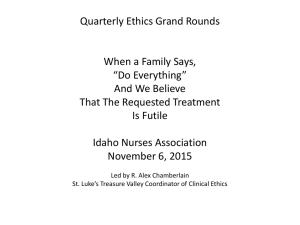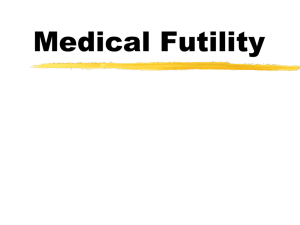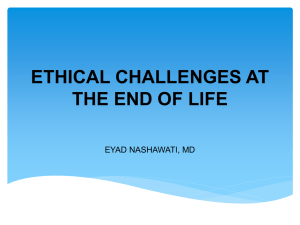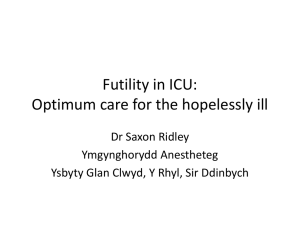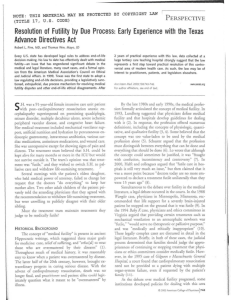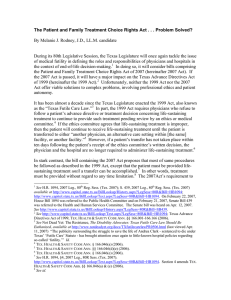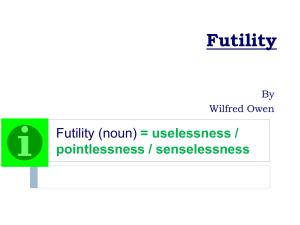Who should make resus decisions?
advertisement
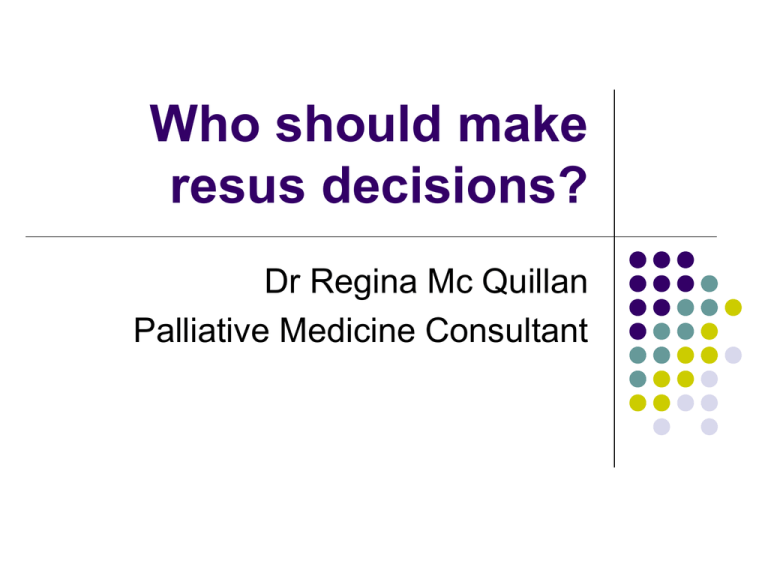
Who should make resus decisions? Dr Regina Mc Quillan Palliative Medicine Consultant Guardian newspaper Goals of Care To cure sometimes, to relieve often, to comfort always An intervention may Cure Rehabilitate Prolong life Stabilize condition Palliate Fail Ethical Behaviour ‘Good is to be done and evil avoided’ Act in the patient’s best interests (Medical Council 4.1) Primum non nocere Beneficence Non-maleficence Consider which treatment option would provide the best clinical outcome for the patient (Medical Council 34.6) Twentieth century Antibiotics Surgery and anaesthetic advances Cancer treatment Diabetes management etc, etc Create an expectation that health can be maintained and death deferred, but at some point, treatment not helpful Challenges in treatment decisions Drive to do all to prolong life The technological imperative Sanctity of life Appropriate recognition of impossibility of prolonging life, and preventing death Rights and responsibilities to withhold or withdraw treatment Do Not Attempt Resuscitation Order A form of advance directive or advance care plan DNAR Urgent need to institute treatment At a time when patient is unable to consent If there is no DNAR, presumption in favour of ACPR Medical Council- End of Life Care 22.2 There is no obligation to start or continue a treatment, or artificial nutrition or hydration, that is futile or disproportionately burdensome 22.4 You should take care to communicate effectively and sensitively with patients and their families so that they can have a clear understanding of what can and cannot be achieved Futility Futility is goal specific Physiological futility is when the proposed intervention cannot physiologically achieve the desired effect. Most objective definition Quantitative futility is when the proposed intervention is highly unlikely to achieve the desired effect. Qualitative futility is when the proposed intervention, if successful, will probably produce such a poor outcome that it is best not to attempt it Sokol, DK. BMJ 2009; 338:b2222 Futile treatment as ritual Rituals are used to make sense of life events CPR may be futile, but when it fails, clearly defines for the family and staff the moment of death Mohammed and Peter, Nursing Ethics, 2009,16(3) 292-302 Attempted cardiopulmonary resuscitation Less than 2% success rate Success rate lower with increasing age, co-morbidities, unwitnessed arrests, out of hospital When to make decision? Health care transitions New diagnosis of fatal illness Deterioration in chronic illness eg -multiple admissions with eg COPD, CCF -MND needing RIG or NIV -nursing home admission -dementia with feeding problems -cancer progression Who makes the decision? Patient choice to refuse treatment even if lifeprolonging If ACPR is not futile, consider patient involvement If ACPR is futile, should not be offered If patient requests ACPR which is considered futile, explore understanding of ACPR; the patient’s wishes should be respected where possible. Doctors are not required to give treatment against their wishes. DHRMF 2010 Who makes the decision? No one has the right to make a health care decision for an adult. Decision-making is the responsibility of the doctor in charge, and must be in the best interests of the patient, in consultation with the multidisciplinary team and the patient’s family network Consultation with the family, sensitive and clear Family Family Whose is the family? Family Whose is the family? Their role is to represent what the patient’s wish may be Must consider the patient’s best interest Team conflict Team conflict If you keep on doing what you are doing, you will keep on getting what you’ve got Team conflict If you keep on doing what you are doing, you will keep on getting what you’ve got Everybody acts in the patient’s interest Team conflict If you keep on doing what you are doing, you will keep on getting what you’ve got Everybody acts in the patient’s interest How to effect change Communicating the decision To the patient, if appropriate To the family, for information, not decision In healthcare record In transfer documentation Who makes resus decisions? The patient can refuse The patient can’t insist on futile treatment If there is doubt about the value, the doctor makes the decision, in the best interests of the patient, following consultation with the patient, family and MDT. Additional reading Medical Futility: its Meaning and Ethical Implications. Schneiderman, Jecker, Jonsen. Annals of Internal Medicine. 1990:112:949-954 Debate: Extraordinary means and the sanctity of life. Journal of Medical Ethics. 1981: 74-82 Guide to Professional Conduct and Ethics for Registered Medical Practitioners 2009
